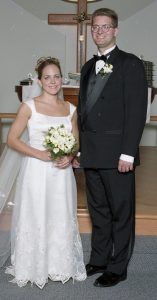
I am 39-year-old woman with complete sacral agenesis. My spine ends at L4. Over the years, I’ve had wonderful experiences and negative experiences, just as anyone does in life. Specifically, I would like to share my memories around my time in college.
Like any 18-year-old ready to go off to school, I wanted to be away from home. I wanted to spread my wings and change the world! I chose a school about four hours from home, so it wasn’t too far but far enough away to feel like I was being independent. I was very prideful about the school I chose because I was academically inclined and looked forward to receiving my diploma from this elite, private liberal arts college. I was over the moon excited.
To say that I was in denial about my disability would be an understatement. I was always able to walk and defied most odds just by being alive. I was “supposed” to die before 6 months and never walk or do anything. I rose to the top and did so with a positivity and zest for life. The college I chose was on a hill in a part of the country that looked like New England. It was gorgeous as a campus alone, and combined with stellar academics, it was perfect. However, I struggled from the beginning with navigating the hilly campus on foot while carrying my heavy backpack.
With tenacity, I tried and tried, and I did so successfully until my junior year in college. For the first time in my life, I was told that I couldn’t walk anymore (I was in excruciating pain in my legs and back) and would need to use a wheelchair while in the diagnosis phase. This transition wouldn’t have been difficult if I had chosen a college that was compliant with the Americans with Disabilities Act (ADA). Unfortunately, this particular college only had two accessible parking spots on the entire campus. Only one of my buildings had a ramp (and not one that was compliant with ADA code), and I couldn’t even access the dining halls, most of the dorms, the library, or the Student Union. Suddenly, I was isolated academically and socially. It was supposed to be a time to grow up and take my learning experience to the next level, but because of barriers on campus, I didn’t have the college experience most kids have. I wasn’t able to just go to class and have fun with my friends. Every day was a fight. I had my physical dilemma, which resulted in major spinal surgery, and what became a “fight” with my university to meet code. I had to take a semester off to have major spinal surgery, which worked and got me mobile again but not to the same capacity. I was not able to navigate my campus anymore. I hired an ADA consultant to help me with my dilemma.
First and foremost, my parents were incredibly supportive and said I didn’t have to go back there and take on this challenge. I could go to a prestigious college of equal status close to home and live at home, not the dorms, but I declined that option. I decided to “take one for the team.” I decided to make it right for not only myself but also for anyone after me with a disability. The college was very hesitant to make changes to follow the law. But because the college receives federal money, it is required to meet all ADA requirements. After many meetings with the dean and president of the university along with my parents and the ADA consultant, they hesitantly “decided” to make changes necessary to meet requirements. Not all the changes were made during the remaining time I had left as an undergraduate, but they did eventually completely comply, including adding an office for disability student services, required by law.
I speak of this experience very distantly because of the emotional pain it brings to the surface. I was unable to even access the library. As an accommodation, my books were delivered. I was unable to visit any friends at dorms other than the one where I lived. My life was entirely focused on the school and ensuring that the university complied with federal laws, laws I had to familiarize myself with very quickly while also navigating through a rigorous academic plan. I cried many nights because I felt so lonely and angry about not being able to access the campus. As part of a liberal arts education, course requirements were included within many different departments. We were required to receive a certain number of credit hours in the arts. I was so excited to take ceramics and other such classes. Well, the building was completely inaccessible to me, so I had to take art history to fulfill that requirement. This was not my choice, and I was unhappy not getting to do what I wanted and what others were able to do because they could physically navigate the campus and buildings. This wasn’t the only way that I was impacted. I remember being in my wheelchair and not being able to get into the restrooms because the doorway was too narrow. It was demoralizing.
My parents told me that one day I would realize the influence I had on my campus. I’m finally getting to the point where I can take pride in the fact that the campus is ADA compliant and there are now students with disabilities attending the university. It was a sacrifice I made to help others so they never have to feel and experience what I did. I’m so glad that goal has been accomplished. Maybe one day, I’ll actually go back and visit the campus to see the fruits of my labor, but for now I just take pride, silently, knowing that one person can have an impact on the lives of others.
Despite the challenges of this experience, I am grateful to have gained these skills at such a young age. I take pride in having received my bachelor’s degree from this university because it is well known academically. Life brings with it many experiences, and life with sacral agenesis adds to those experiences. I feel enriched by gaining the knowledge of my rights as an individual with a disability and stand tall to protect them and those of others who may not speak up for themselves.
